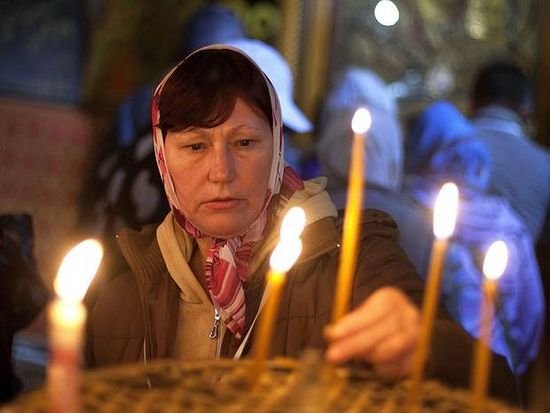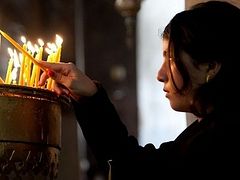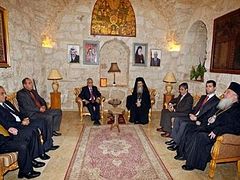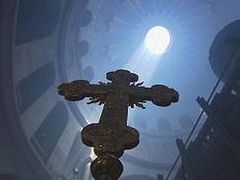SOURCE: Independent.co.uk

For years, Palestinian Christians have been quietly abandoning the place where Jesus is said to have been born in a manger. Middle-class residents here have packed their bags for less chaotic lives in Latin America, Europe and the US. Tourism ground to a halt more than a decade ago, during the second Palestinian intifada, or uprising, and is now experiencing a comeback.
But Palestinians say major challenges remain: the Israeli military checkpoints and security barrier that separates Bethlehem from Jerusalem, a 10-minute drive away; the shuttered homes and shops that are symbols of a stagnant economy; and the Israeli settlements that are growing around Bethlehem on land claimed by the Palestinians for a future state.
Vera Baboun, Bethlehem’s first female mayor, wants to make her city open to all, especially to Christian pilgrims – and those Palestinians who have left. A Christian whose late husband spent three years in an Israel jail during the first intifada, Ms Baboun wants to lure back former residents and roll out the red carpet to encourage Christian pilgrims to extend their stays.
Borrowing a tactic from American retailers, the mayor lit the Christmas tree in Manger Square two weeks earlier than usual this year, added singers and dancers to the daily festivities and kept the crafts market open for eight days instead of one.
She is expediting permits for five boutique hotels that will add 300 rooms to the existing supply of 3,700, which are filled during Christmas week but often sit empty during the rest of the year.
Efforts are under way to improve handicapped accessibility to the town for ageing visitors and to renovate the Church of the Nativity, which Unesco says is the oldest Christian church still in daily use. “This is the place where the message of peace was born with Jesus Christ,” Ms Baboun said. “When they talk about reviving the message, you need to revive the city.”
Clergy say the out-migration eventually could reduce Bethlehem’s historic churches to mere tourist attractions – a body without a beating heart. “It’s not enough to come and see the ancient stones,” said Father Shomali, a parish priest. “You need the living stones.”
Bethlehem was engulfed by fighting during the second intifada, including a 39-day stand-off between Israeli troops and Palestinian militants who hid inside the Church of the Nativity. A new film titled Bethlehem, out in February, recalls those tumultuous days and tells the fictional story of an Israeli intelligence agent and his young Palestinian informant. But with the violence long over and US-brokered peace talks again under way, Ms Baboun is ready to focus on the future.
Tourist visits are up this year, to about 1.6 million, Palestinians officials say. Most visitors come by charter bus, however, and linger just long enough to peer into the grotto at the Church of the Nativity where Jesus is said to have been born. Few stop to buy a string of rosary beads, or enjoy a plate of hummus. Almost all spend the night at hotels inside Israel, which competes with Bethlehem for tourism dollars. “We don’t benefit from the buying power of these tourists,” said Fayrouz Khoury, deputy director of the chamber of commerce.
Taxis from Jerusalem often refuse to take travellers into Bethlehem, and Jewish Israelis are warned against entering the city, according to the Israeli Defence Forces – the Israeli army. Detailed Google navigational maps end at the Israeli military checkpoints. “We cannot improve the tourism sector under occupation,” said the Palestinian Tourism Minister Rula Ma’aya.
Efforts to stem Christian emigration have gone even more slowly. During the Ottoman era a century ago, Bethlehem was 90 per cent Christian. Today the city of 22,000 is more than two-thirds Muslim, thanks to an exodus of Christians, an influx of Palestinian Muslims and a higher Muslim birth rate.
Christian leaders arrange meetings with tourism and economic development officials with visiting emigrés, who show up “with a lot of enthusiasm to invest and create jobs”, Mr Khoury said. “But when they see the conditions aren’t so encouraging, they leave again.”
One sign of international support for Bethlehem’s rejuvenation is a new billboard in Manger Square touting a “gift from the American people to the Palestinian people” – a US Agency for International Development-funded road improvement project, part of a $100m (£61m) West Bank infrastructure package.
“We’ll better connect people with jobs and better connect tourists and pilgrims to this holy place,” Secretary of State John Kerry said during a visit here last month. “This is a road not just worth building here, but it’s a road worth travelling on, for all of us.”



